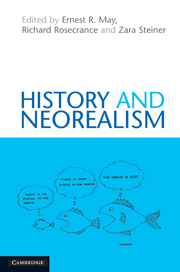Book contents
- Frontmatter
- Contents
- List of tables
- Notes on contributors
- Acknowledgments
- 1 Theory and international history
- 2 Transformations in power
- 3 Domestically driven deviations: internal regimes, leaders, and realism's power line
- 4 How international institutions affect outcomes
- 5 Not even for the seventeenth and eighteenth centuries: power and order in the early modern era
- 6 Austria-Hungary and the coming of the First World War
- 7 British decisions for peace and war 1938–1939: the rise and fall of realism
- 8 Realism and risk in 1938: German foreign policy and the Munich Crisis
- 9 Domestic politics, interservice impasse, and Japan's decisions for war
- 10 Military audacity: Mao Zedong, Liu Shaoqi, and China's adventure in Korea
- 11 The United States' underuse of military power
- 12 The overuse of American power
- 13 Redrawing the Soviet power line: Gorbachev and the end of the Cold War
- 14 Shared sovereignty in the European Union: Germany's economic governance
- 15 John Mearsheimer's “elementary geometry of power”: Euclidean moment or an intellectual blind alley?
- 16 History and neorealism reconsidered
- Index
- References
10 - Military audacity: Mao Zedong, Liu Shaoqi, and China's adventure in Korea
Published online by Cambridge University Press: 05 June 2012
- Frontmatter
- Contents
- List of tables
- Notes on contributors
- Acknowledgments
- 1 Theory and international history
- 2 Transformations in power
- 3 Domestically driven deviations: internal regimes, leaders, and realism's power line
- 4 How international institutions affect outcomes
- 5 Not even for the seventeenth and eighteenth centuries: power and order in the early modern era
- 6 Austria-Hungary and the coming of the First World War
- 7 British decisions for peace and war 1938–1939: the rise and fall of realism
- 8 Realism and risk in 1938: German foreign policy and the Munich Crisis
- 9 Domestic politics, interservice impasse, and Japan's decisions for war
- 10 Military audacity: Mao Zedong, Liu Shaoqi, and China's adventure in Korea
- 11 The United States' underuse of military power
- 12 The overuse of American power
- 13 Redrawing the Soviet power line: Gorbachev and the end of the Cold War
- 14 Shared sovereignty in the European Union: Germany's economic governance
- 15 John Mearsheimer's “elementary geometry of power”: Euclidean moment or an intellectual blind alley?
- 16 History and neorealism reconsidered
- Index
- References
Summary
In the study of international relations, it is popular to imagine leaders as constrained by the distribution of material power. If military balances and alliance patterns do not dictate foreign policy, they can still pose powerful incentives that leaders ignore at their peril. For this reason, leaders often give way before stronger rivals, or at least defer military conflict with them as they build up their own strength. Nonetheless, some leaders are much less deferential when the balance of power is not in their favor. Rulers from Alexander the Great to Ho Chi Minh have fought for remarkably audacious goals, even when their forces were outnumbered or outgunned. In fact, states have launched wars against significantly stronger adversaries at least eleven times since World War II alone. In short, while leaders often avoid conflict with more powerful states, the exceptions to this rule are too numerous and noteworthy to ignore.
Why do leaders vary in their willingness to attack the forces of stronger opponents? Or to use a term employed in this volume, why are some leaders more willing to punch above the “power line” of their state? It is tempting to focus on individual tolerances for risk as an explanation. Typically, risk-taking refers to the selection of choices that offer a wider array of potential outcomes: “risky” options promise relatively great rewards if successful but relatively great costs if they fail. Defined in this way, attacking a stronger state seems like a fairly risky option, other things being equal.
- Type
- Chapter
- Information
- History and Neorealism , pp. 201 - 227Publisher: Cambridge University PressPrint publication year: 2010



